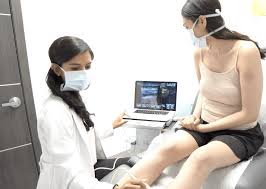Varicose veins are more than just a cosmetic issue. They can cause discomfort, pain, swelling, and lead to complications if left untreated. When it comes to treatment, a common question arises: What type of doctor treats varicose veins? The answer isn’t always straightforward, as multiple specialists offer vein treatments. However, vascular surgeons are often considered top-tier professionals in this area due to their advanced training and surgical capabilities.
Understanding which doctor to choose is essential because vein conditions vary in severity. Some patients only need non-invasive procedures, while others require surgical intervention. Selecting the right specialist directly affects the quality of care, speed of recovery, and long-term results.
Are Vascular Surgeons the Most Qualified Vein Treatment Doctors?
Vascular surgeons specialize in diagnosing and treating disorders of the blood vessels, including arteries and veins. This makes them uniquely qualified to manage complicated vein conditions. They are trained to perform both minimally invasive procedures and major surgeries, depending on the patient’s needs.
However, it’s important to recognize that other types of vein treatment doctors may also provide effective care. Interventional radiologists and phlebologists are examples of specialists who often handle varicose vein treatments. The key difference lies in the range of procedures they can perform and their ability to treat both superficial and deep vein disorders.
So, is a vascular surgeon the best doctor for varicose veins? In many cases, yes—especially for patients with advanced vein disease or a history of complications. Their comprehensive understanding of vascular health ensures a more accurate diagnosis and a broader set of treatment options.
Why Do Patients Seek Vein Treatment Doctors in the First Place?
People often seek vein treatment doctors due to a combination of symptoms and concerns. Varicose veins may cause:
- Aching or throbbing legs
- Swelling in the calves or ankles
- Discoloration of the skin
- Bulging or twisted veins
- Heaviness and fatigue in the legs
In addition to physical discomfort, there’s also the emotional impact. Many people feel self-conscious about how varicose veins look, especially if they’re on visible areas like the legs.
Patients want solutions that are safe, effective, and long-lasting. That’s why choosing the right vein specialist is so critical. With an experienced doctor, patients gain access to accurate assessments, advanced treatment options, and personalized care plans.
What Are the Common Treatments Offered by Vein Treatment Doctors?
Modern vein care has come a long way from traditional vein stripping surgery. Today’s treatments are minimally invasive, fast, and often performed in outpatient settings. Some of the most common procedures offered by vein treatment doctors include:
- Endovenous Laser Therapy (EVLT): A laser fiber is inserted into the vein to seal it shut. This is a popular choice for large varicose veins.
- Radiofrequency Ablation (RFA): Similar to EVLT, but uses radiofrequency energy instead of laser to close off the vein.
- Sclerotherapy: A solution is injected into smaller veins to collapse and absorb them naturally.
- Ambulatory Phlebectomy: A minor surgical procedure to remove visible veins through tiny incisions.
- VenaSeal Closure System: A medical adhesive used to close off diseased veins without the need for heat or anesthesia.
All these treatments are effective, but the best option depends on the patient’s vein condition, medical history, and treatment goals. That’s why consulting an expert vein treatment doctor, such as a vascular surgeon, is so important.
Can Other Doctors Also Treat Varicose Veins Effectively?
Yes, there are several specialists who treat varicose veins effectively. These include:
- Phlebologists: Doctors who specialize exclusively in vein diseases. Many have backgrounds in dermatology or internal medicine.
- Interventional Radiologists: Experts in image-guided procedures who use minimally invasive techniques to treat varicose veins.
- Dermatologists: Often treat spider veins and minor varicose veins, especially for cosmetic purposes.
Each type of doctor brings unique expertise. For patients with mild symptoms or cosmetic concerns, a dermatologist or phlebologist might be enough. But for those with complex vein disease, a vascular surgeon or interventional radiologist is often a better choice.
The important takeaway is that not all vein doctors are the same. The focus keyword “what type of doctor treats varicose veins” is vital in helping patients make informed decisions about their care.
How Do You Choose the Best Vein Treatment Doctor for Your Needs?
When searching for a vein specialist, patients often start by Googling phrases like “vein treatment doctors near me.” While location is important, qualifications and experience matter more. Here are a few tips to choose the right doctor:
- Check Credentials: Make sure the doctor is board-certified in a relevant specialty, such as vascular surgery or interventional radiology.
- Ask About Experience: How many vein procedures has the doctor performed? Do they treat complex cases?
- Review Treatment Options: A good doctor will offer a range of treatment choices and explain the pros and cons of each.
- Evaluate the Clinic: Choose a vein treatment center with modern equipment, accredited facilities, and a strong reputation.
- Read Reviews and Testimonials: Patient experiences can provide insights into the quality of care and patient satisfaction.
Ultimately, the best vein treatment doctor is one who listens, understands your concerns, and develops a personalized care plan that aligns with your goals.
What Role Does Technology Play in Varicose Vein Treatment?
Technology has transformed the field of vein care. Advanced imaging tools like duplex ultrasound allow doctors to view blood flow in real-time, leading to accurate diagnoses. Newer treatments use precision-guided tools to close off diseased veins with minimal discomfort and downtime.
Many vein treatment doctors now perform procedures in-office using local anesthesia. Recovery times are shorter, and patients can often return to normal activities the same day. This convenience has made modern vein treatment more accessible and appealing than ever.
Vascular surgeons, because of their surgical training and access to hospital-grade tools, are often at the forefront of these technological advancements. However, other vein specialists are also incorporating new techniques and devices to enhance patient outcomes.
Is It Worth Seeing a Specialist for Varicose Veins?
Absolutely. While varicose veins may seem minor, they are often symptoms of underlying venous insufficiency. Left untreated, this condition can lead to complications such as skin ulcers, deep vein thrombosis (DVT), and chronic leg swelling.
Seeing a vein treatment doctor early helps prevent these issues. Whether you choose a vascular surgeon, a phlebologist, or an interventional radiologist, make sure the specialist has experience in treating a range of vein conditions.
The question isn’t just what type of doctor treats varicose veins—it’s which one is right for your situation. Always choose a provider who prioritizes your health, comfort, and long-term wellness.
In conclusion, vascular surgeons are often the best choice for complex or advanced varicose vein conditions due to their comprehensive training and surgical expertise. Still, other specialists can offer excellent care depending on the severity and nature of your vein problems. When in doubt, consult a trusted vein treatment doctor to explore your options and take the first step toward healthier legs.







